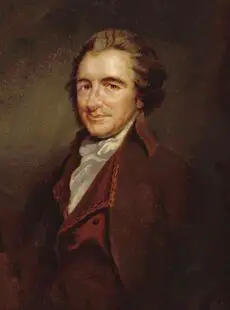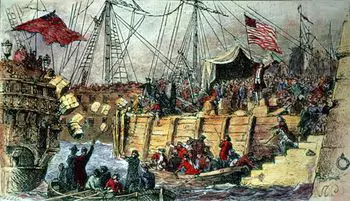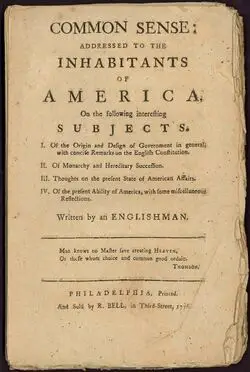Why Did American Colonists Become United Against England
Colonial Americans enjoyed relative independence from England until 1763, which marked the cessation of the Seven Years’ War. Prior to that time, the British government had paid little attention to the domestic affairs conducted by their American colonists. The war was costly; however, and England deemed it appropriate that American colonies contribute to the war debt and the costs associated with stationing British troops on American soil. The British government assessed taxes on the colonies yet denied colonists the right to Parliamentary representation in the House of Commons.
As a result, Americans saw themselves as being subordinates to the Crown rather than as equal members of the British Empire, thus prompting the colonists to rebel against their mother country in the name of liberty. Parliament’s actions fostered a sense of rebellion amongst the inhabitants of America, while Thomas Paine unleashed a patriotic fervor throughout the colonies that solidified a nation.
Englishmen and Americans alike were filled with British pride following the successful conclusion of the Seven Years’ War. Americans, who were separated both geographically and governmentally from England, felt a renewed sense of kinship with their British brethren. This attitude began to change when King George III issued the Proclamation of 1763, which prohibited colonial expansion west of the Appalachian Mountains. Not accustomed to Crown intervention pertaining to domestic affairs, agitation began to stir amongst rebellious colonists.
Taxes
When Parliament passed the Sugar Act of 1764, the British pride felt by Americans quickly began to wane.[1] Although this act did decrease the taxes paid by colonists on imported molasses, the long-established practice of smuggling goods in and out of the country, which violated the Navigation Acts of 1651, was no longer feasible.[2]The Sugar Act, along with the simultaneously enacted Revenue Act, was detrimental to coastal merchants. The Revenue Act mandated that wools, hides, and other items that were not previously subjected to the Navigation Acts, were required to pass through England rather than being shipped directly from America to their destinations. This was another yet attempt by King George to attain money from the colonies in order to reduce England’s war debt. American citizens, already feeling the pangs of post-war recession, were feeling their economic security threatened.
The disenchantment with Britain, which was slowly simmering, reached a fevered pitch in 1765 with the passage of the Stamp Act; the first direct tax Parliament had levied on the colonies. Whereas all other duties had been paid through trade regulations, this law constituted direct governmental intervention upon a people who had no representation in Parliament. Colonists were of the mind to be dutiful English citizens when they were treated as such. The Stamp Act, which required a stamp purchased through British authorities to be affixed to all printed materials, threatened both the finances and liberties of colonists.[3]While providing the first major split between England and America, the Stamp Act concurrently began to unite the colonies as a nation.
Signs of Unification
Americans surprised London merchants by boycotting English goods while the Stamp Act was in effect. Colonists banded together, with the urging of such groups like the Sons of Liberty, and posted numerous broadsides and conducted impromptu meetings in the streets to heighten their fellow citizens’ awareness of the oppressive actions being taken by Parliament. Groups such as these began to appear throughout the colonies and politics began to consume the thoughts and conversations not only of colonial leaders but of average citizens as well.
According to historian Eric Foner, “Parliament had inadvertently united America.”[4]Rather than seeing themselves as separate entities, the colonies were cooperating instead of competing with one another. In October 1765, the colonies became more unified when the Colonial Congress met to discuss the Stamp Act in New York. Colonial leaders convened and formally advocated the boycott of British goods. The boycott posed a formidable economic threat to London merchants, who successfully persuaded Parliament to repeal the Stamp Act just one year after its issuance.
Boston
On March 5, 1770, the Boston Massacre pushed the colonists closer together and increased the level of dissent against the British across the colonies. The Massacre was a confrontation between colonists and British soldiers on the streets of Boston that escalated to violence resulting in the death of five Bostonians by British soldiers. The details of the event were (and still are) blurred and biased, yet Massachusetts silversmith Paul Revere created an etching that depicted British soldiers executing unarmed Bostonians. This type of propaganda escalated anti-British sentiment, which in turn bolstered colonial pride and the determination to gain and hold liberty. The quest for liberty and equal justice was exemplified by the action of John Adams when he chose to defend the British soldiers involved in the Boston Massacre. Adams held that to fight for justice and equality, all were due to a fair trial, including the British soldiers. His loyalty to the Patriot cause was well known, thus affording him the ability to emerge from this endeavor unscathed and with his esteemed reputation intact.
With the new taxes imposed and continued Crown intervention, Americans became more ardent in their resolve that they would not become enslaved to a distant government. Liberty was on the minds of patriots while the idea of independence from the British Empire crept into the discussions of colonial leaders. The climactic event which propelled the final split with England came on December 16, 1773, when certain colonists engaged in what became to be known as the Boston Tea Party. Sam Adams supposedly instigated the act of disposing of a shipment of British tea into Boston Harbor; which cost the Crown over ten thousand pounds in revenue. The Tea Act issued earlier in the year agitated rebellious colonists to the point of destructive and violent action.
The subsequent reaction from London was to further oppress the colonists through a stringent new set of laws Americans called the Intolerable Acts. King George’s wrath was aimed at New England. Thus he closed the port of Boston until compensation was made for the lost tea revenue. Through these acts, town meetings in Massachusetts were stifled; the British government appointed council members in New England and lodged soldiers in private homes.[5]Outrage swept not only through New England but throughout all American colonies.

Massachusetts delegates met in September 1774 and concluded that New England taxes would be withheld, preparations for war would be made, and obedience to England would be denied. These resolutions were known as the Suffolk Resolves. To further reinforce solidarity, leaders of all the colonies, except those from Georgia, met in Philadelphia as the First Continental Congress. The goal of the convention was to coordinate a unified response to the Intolerable Acts[6] This historic meeting did more than coordinate colonial efforts; the concrete unification of a nation transpired. Virginia orator Patrick Henry best described the attitude of the nation when he proclaimed, “‘I am not a Virginian, but an American.’”[7] Unwittingly, England had united her once subordinate colonists into a formidable adversary.
Common Sense
In an ironic twist, colonists who were once filled with British pride were now consumed with American patriotism. When Americans realized they would never be considered equals with Englishmen, they resolved to find that sense of equality among themselves; while concurrently denying such liberties to those who were deemed inferior. Such men as John and Samuel Adams, Benjamin Franklin, Thomas Jefferson, and Patrick Henry courageously paved the path to freedom for white men in the colonies. Arguably, the man most instrumental in the movement towards independence, and perhaps the forgotten Founding Father, was Thomas Paine.
An Englishman born in 1737, Paine arrived in Philadelphia on November 30, 1774, at the urging of Benjamin Franklin. Paine defined the origin of government as “a mode rendered necessary by the inability of moral virtue to govern the world.”[8] He believed governmental representation was a right for every citizen and wrote his pamphlet, Common Sense, in a language accessible to all. Through Paine’s words, poor white citizens were able to envision a role in the electoral process and a voice in the legislature. For generations, these people were seen as intellectually inferior to the gentry class and were therefore deemed unworthy of consideration. Although far less educated than the elites, the lower classes were not necessarily less intelligent. Thomas Paine recognized their grasp of politics and understanding of freedom.
Paine’s language and call for a new form of government struck a chord with everyday men and invoked a sense of purpose among small farmers and poor whites. His words instilled ideas in average citizens and brought to light notions held within this group that had lain dormant in their hearts and minds. Public discussions took place among commoners regarding politics and social change. People envisioned a future in which their wishes were considered. The generals and diplomats may have been gentry but the men fighting and dying were ordinary farmers.
Paine's Influence
One reason Common Sense was such an influential piece was because it was written in a manner understandable by all. Most subsistence farmers of the time did not have an education conducive to understanding the essence of someone such as philosopher John Locke. Paine used a common language to appeal to people in all levels of society. By doing so, he discredited the notion that poor farmers and others of the lower classes had no choice but to abide by any law put forth by a distant government. Individually they did not, but when Paine erased the sense of isolation prevalent throughout the rural communities, he did enlighten those citizens, which in turn elicited their response to revoke tacit consent.
A second reason for the success of Paine’s work is that his words appealed to the overwhelmingly Protestant audience which comprised the citizenship of the colonies. Well aware of his audience, Paine expressly employed biblical rhetoric to convey to the colonists that God is the only king and that it angers Him to be aware of anyone else in His role. Paine selected biblical quotations that indicate it is wrong, and even blasphemous to give a man the title of “king,” which suggests God can be replaced. By quoting and alluding to scripture early in his argument, Paine captured his audience. Through his use of history, religion, and sheer logic, Thomas Paine presented a compelling case that a monarchy is a blasphemous and oppressive form of government from which liberty for the common man could never be realized. He assured his readers that they were more worthy of God’s gifts than a greedy tyrant and that God did indeed create everyone equally. This, of course, is the premise upon which the Declaration of Independence is based.
Paine made a plea to potential patriots by confidently stating that “The nearer any government approaches a republic the less business there is for a king.”[9]Once Paine instilled this thought in the reader; he continued to raise the fear that without a republic “slavery ensues.”[10]This was an especially powerful notion as Parliament was levying taxes at a rapid pace and without some form of legislative representation, farmers, trappers, and shippers were certain to have their livelihoods threatened, if not completely eradicated. It can be argued that the combination of England’s taxation policies and the release of Common Sense, worked in concert to create one cohesive nation rather than thirteen loosely joined colonies.
Conclusion
In the introduction to Common Sense, Paine declares “a long habit of not thinking a thing wrong, gives it a superficial appearance of being right.”[11] This simple sentence opened the minds of common citizens to the possibilities of a less oppressive future in an egalitarian society for white men. Thomas Paine anonymously unleashed the buried patriot spirit of average American colonists. While Parliament was implementing strict tax laws and occupying the American continent, Thomas Paine was transforming the lives and attitudes of its inhabitants. England created an atmosphere of future subservience among the colonists, while Thomas Paine reached out to these same people and through his inspired words, fomented a revolution.
References
- Jump up ↑ Eric Foner, Give Me Liberty! An American History, 2nd ed., vol. 1 (New York: W.W. Norton & Company, 2009), 171.
- Jump up ↑ Foner, 83.
- Jump up ↑ Foner, 171.
- Jump up ↑ Foner, 173.
- Jump up ↑ Foner, 180.
- Jump up ↑ Foner, 181.
- Jump up ↑ Patrick Henry quoted in Foner, 181.
- Jump up ↑ Thomas Paine, “Common Sense,” 1776, in Common Sense, Rights of Man, and Other Essential Writings of Thomas Paine (New York: Signet, 2003), 7.
- Jump up ↑ Paine, 20.
- Jump up ↑ Paine, 21.
- Jump up ↑ Paine,3.
Related DailyHistory.org Articles
- Why did the Continental Congress adopt the Articles of Confederation
- Why did the United States Continental Congress approve The Model Treaty of 1776
- How did Great Britain win the French Indian War (Seven Years War)
- The Radicalism of the American Revolution - Book Review
- Why did African Americans join the British Army during the American Revolution
- What are the Origins of the Abolitionist Movement
- American Revolution Top Ten Booklist
- What was George Washington's military experience before the American Revolution
Updated October 4, 2019


